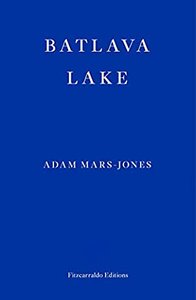Adam Mars-Jones is one of those writers I’ve managed to hear of without knowing much about their work. After reading this short (under 100 pages) novel, I am keen to explore more.
The narrator of Batlava Lake is Barry Ashton, a civilian engineer working with the British army in Kosovo in 1999. This is how his account begins:
Lake Batlava is beautiful. Deep, not exactly welcoming. I don’t expect the locals think it’s much like Loch Ness, but we did. I did. No legends about monsters, none that I’d heard of. But how would I get to hear that about them anyway? I’d have to speak the language, and the Barry brain doesn’t do languages. Just doesn’t want to know. ‘Gut und Morgen’ is about as much as I can manage in foreign parts, doesn’t get you far in Kosovo. Plus we weren’t there as sightseers, though we saw some sights. We saw some sights.
This first paragraph establishes a fair amount about Barry: he’s chatty and matey, but can be insensitive to social niceties and the feelings of others. He’s more of a practical person than an intellectual one. There’s also plenty he is not telling us yet: immediately I wonder what’s behind “We saw some sights”.
The prose of Batlava Lake provides an interesting comparison with James Clammer’s Insignificance, another novel written from the viewpoint of a man who works with his hands. But where the effect of Insignificance was to open its protagonist up to us – to show him as a thinker as well as a doer – Barry’s narration helps to obscure him. He talks a lot, but it feels like a front – or at least that he’s unclear on exactly what he wants to say.
Still, behind all Barry’s talk is a story: a story of his deteriorating personal relationships, but perhaps especially a story of the brutality of war. This is a narrator who’s not really up to the task of conveying the gravity of that subject, let alone that of empathising with the victims of the conflict. Yet I found Batlava Lake powerful despite this, because it’s possible to read between the lines of what Barry says. Here the book’s shortness works in its favour: in a longer narrative, the effect might have been diluted. Instead, Batlava Lake builds to a crescendo, and ends in a place that feels just right.
Published by Fitzcarraldo Editions.

0 Comments
1 Pingback